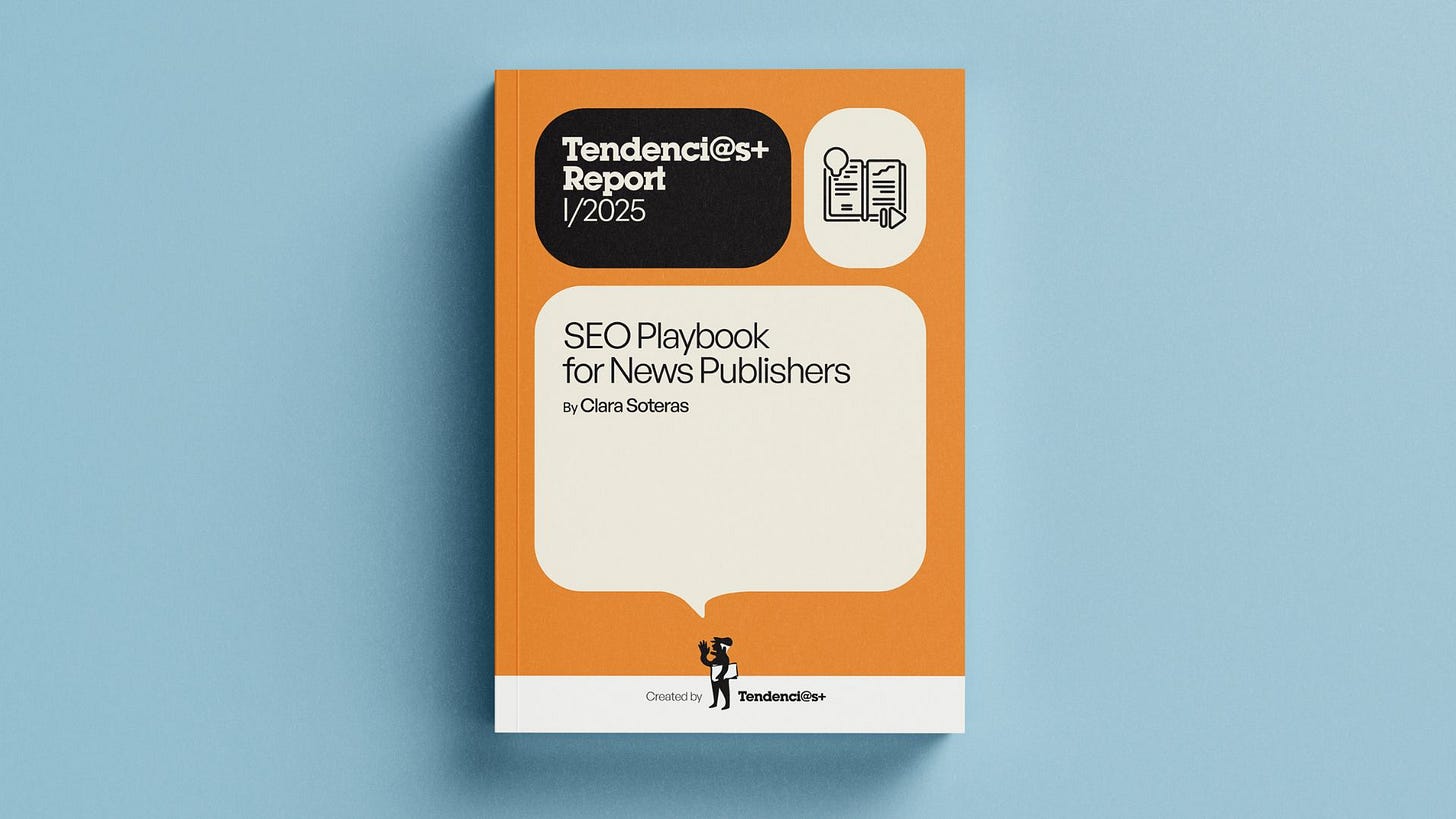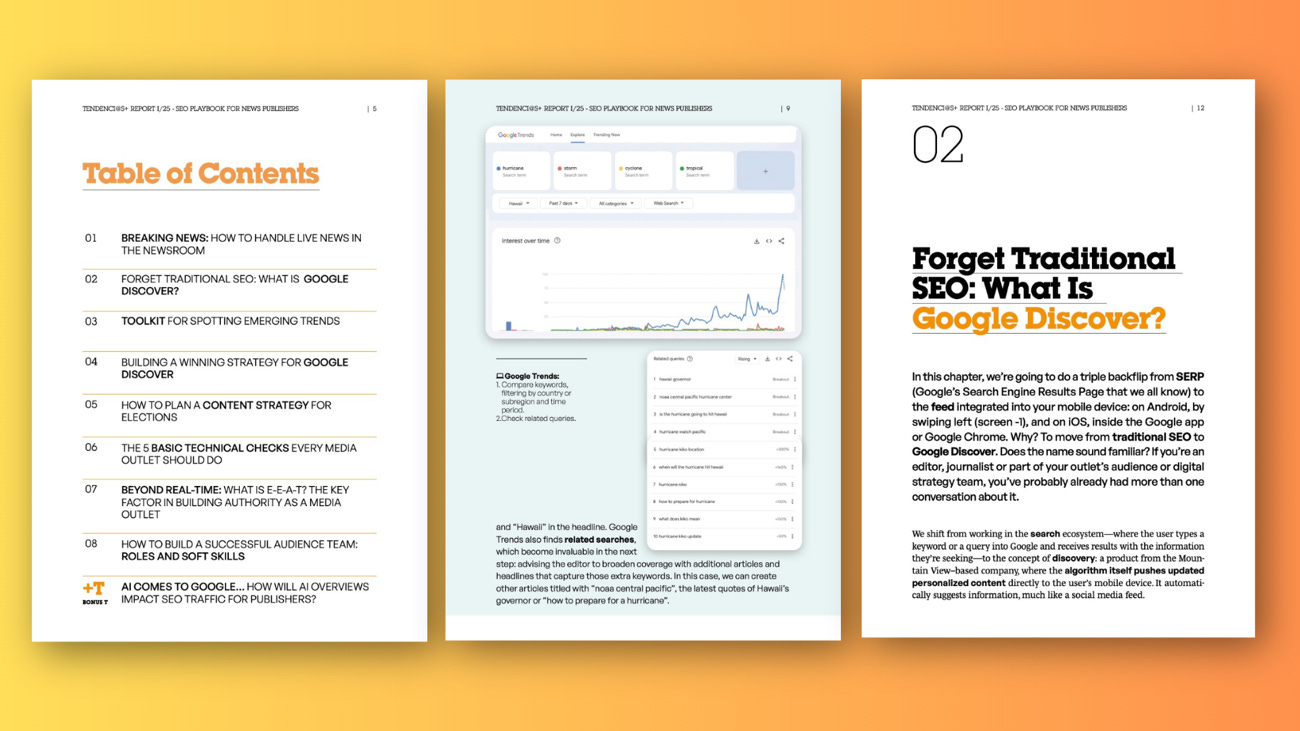Generative Engines and the Future of Search
AI is changing how audiences find and consume content. SEO is no longer about tricks or tags — it’s about authority, trust and experience. Clara Soteras offers a playbook for the age of AI Overviews.
Clara Soteras is an expert consultant in SEO and digital strategy for news publishers. who helps media organisations grow audiences through product-focused approaches to search and content. She is Head of Innovation and Digital Strategy at AMIC, representing more than 600 local and regional outlets, and teaches digital Journalism, strategy and SEO at Autonomous University of Barcelona SEO for News in business schools.
She recently published SEO Playbook for News Publishers, a bilingual guide that distils the key principles of editorial and technical optimisation for journalists and editors. Clara also judges the Global, European and UK Search Awards, advises the European Commission’s AI Office on the AI Act, and frequently speaks at industry events on SEO, product strategy and AI in publishing. An active member of #MujeresEnSEO and Google Product Experts, she promotes SEO literacy across newsrooms and has previously led SEO and product teams at El Nacional and betevé, where she launched new verticals and trained editorial staff to improve visibility and engagement.
Traditional Search Engine Optimisation is dead. In 2025, we are operating in a new era defined by “generative engine optimisation,” where the strategic imperative is no longer to simply rank for keywords but to provide unique, undeniable value in an AI-driven ecosystem.
Or at least, that’s what everyone wants you to believe. The truth? SEO is alive, kicking, and more critical than ever. While generative engines grab the headlines, the foundations that drive real traffic haven’t changed. To navigate this new ecosystem, we can turn to an unlikely guide: the perfect summer ice cream. This article summarises the key strategic insights from Clara Soteras’s forward-looking analysis (from an article published at her blog titled: “The Future of SEO for News Publishers in 2025: Crafting the Perfect Recipe for the Best Summer Ice Cream”), framing the future of SEO for news publishers as a recipe for crafting a memorable, high-quality product that builds a sustainable business.
Adapt to the New User Menu of Multi-Modal & Multi-Platform Search
The foundational change impacting all media strategy is the fragmentation of user search behaviour. Just as a customer decides how they want to eat their ice cream, users now have more choices than ever for how and where they seek information. This evolution demands a strategic response to two core trends:
Multi-modal Search (The ‘How’): Users are moving beyond the text query. They now interact with search engines dynamically, from snapping a photo of a plant to identify it to using a voice command to find a recipe.
Multi-platform Search (The ‘Where’): Users intuitively select different platforms for different needs, understanding that the best answer for one query might not come from the same place as another.
This platform fragmentation means a monolithic, Google-centric SEO strategy is no longer viable. Audience discovery must now be managed across a portfolio of platforms, each with unique user intent. The most disruptive change, however, is how AI is beginning to answer questions directly on Google, causing long-standing traffic sources to vanish.
The Strategic Threat: Confronting the Great Melt of Evergreen Traffic
Like ice cream on a summer afternoon, the reliable “evergreen” traffic that publishers have long depended on is rapidly melting away. This is not a new phenomenon, but an acceleration of a pre-existing trend. Even before AI Overviews became widespread, 0-click searches accounted for over 58.5% of all searches in 2024. Now, Google’s AI-generated answers to common informational queries are accelerating this decline by eliminating the user’s need to click through to an article. This shift effectively demonetises entire categories of content, forcing a fundamental rethink of any traffic strategy built on informational “how-to” guides.
While Google’s Head of Search, Elizabeth Reid, argues that AI Overviews lead to “more quality clicks,” this perspective fails to align with the current media business model. As Soteras notes, “this is something that doesn’t work for the vast majority of media outlets... Monetisation still relies on volume.” The data from the ground confirms the impact:
As expert Ryan Law reported, confirming early data from Ahrefs, AI Overviews are cutting clicks by 34.5%. A report from Enders Analysis underscores the severity, stating that many UK publishers have lost up to 80% of their visibility compared to 2019.
The queries most affected are the timeless, informational searches that were once a cornerstone of organic traffic strategies. AI now directly answers searches like:
“how to take a screenshot”
“how to care for an orchid”
“how to make mate”
As evergreen content melts away, publishers must double down on the one flavour that AI can’t replicate: the urgency and authority of breaking news.
The Safe Bet: Why Breaking News Remains an Enduring Classic
Breaking news remains the critical, enduring traffic driver for media outlets. It is the classic flavour that users will always seek from a trusted source. Google has confirmed it will continue to prioritise news and media organisation’s for current affairs and trending information, primarily through the prominent “Top Stories” module.
This is clearly evident in searches for timely events, such as wildfires in Spain or queries like “guy’s hospital” in the UK, where Google prominently displays carousels linking directly to media outlets. While this traffic is essential, it is fleeting. Relying on it alone is not a sustainable business model. To build a truly resilient organisation, media outlets must rethink their entire strategy and become the best “ice cream shop” in town.
7 Strategies to Become the Best “Ice Cream Shop” in 2025
To thrive in the new AI-driven search era, news publishers must adopt a new set of strategies focused on building an unassailable brand, a loyal community, and a superior experience.
Redefine Success: Focus on Loyal Customers, Not Passing Tourists. The old KPIs of page views and unique users are obsolete. The strategic imperative is to shift focus from attracting one-time “tourists” to cultivating a loyal customer base. A loyal reader who returns, becomes an “ambassador” for your brand, and remembers your name is infinitely more valuable than a transient visitor.
Perfect Your Unique Recipe: Build Unassailable Authority and E-E-A-T. Google rewards content that demonstrates high levels of E-E-A-T (Experience, Expertise, Authoritativeness, and Trustworthiness). To stand out, publishers must create a unique and memorable product. Think of Rocambolesc’s brioche filled with ice cream. This isn’t just a unique product; it’s a content format like a data visualisation or an interactive tool that no one else offers and that AI cannot easily replicate. A key tactic here is to build such strong brand authority that users actively choose you as a “preferred source” in Google’s Top Stories, a priceless competitive advantage.
Master the Full Experience: From the Cookie to the Chocolate Tip. User experience (UX) is a critical ranking factor. A poor experience—cluttered with intrusive ads or slow to load—is like a stale cone that ruins even the best ice cream. Beyond the basics, publishers must perfect the “melted chocolate at the end of the cone” moment: surprising the user with a valuable, context-aware call-to-action (like subscribing to a relevant newsletter or reading a related article) just as they finish the content.
Leverage Authentic Voices: Earn Trust with User-Generated Content. Google is increasingly prioritising authentic, first-hand perspectives from forums like Reddit. Publishers must work to get influencers and real users talking about their brand and content. This user-generated content (UGC) is becoming a powerful signal of trust and relevance that search engines are designed to reward.
Create Buzz: Engineer the “Queue Effect” Through Community. Distinct from leveraging individual influencers, the “queue effect” is about generating visible, collective excitement. A line outside your ice cream shop creates curiosity and attracts new customers organically. In the digital world, this is achieved through strong social media engagement and active community-building. This cross-departmental effort creates a buzz that signals to both users and search engines that your brand is a vital destination.
Know Your Audience: Serve Core User Needs Beyond Information. The informational function of media is no longer enough. Citing the “User Needs” model from Dmitry Shishkin, publishers must expand their offerings. This means going beyond just informing to also entertain, educate, provide context, or offer valuable services. Understanding what your specific audience needs is the first step to creating a product they can’t get anywhere else.
Strategically Use Google Discover as a Topping. Google Discover is a volatile but indispensable traffic source. It should be treated as the “chocolate chips or syrup”—an extra topping that makes the experience sweeter but isn’t the core product. The key to success on Discover is a deep understanding of your topical authority. Consistently publishing high-quality content that aligns with your brand’s established areas of expertise is essential to capturing this powerful, if unpredictable, audience stream.
From a Single Scoop to a Sustainable Business
In the age of generative AI, the game is no longer about chasing keyword volume. It is about building a distinct brand, fostering a loyal community, and providing unique, undeniable value. The central lesson is clear: create your own unique ice cream flavour and offer an experience so memorable that it keeps your customers coming back, day after day. This is the only path from selling single scoops to building a sustainable business.
For a more detailed exploration of these concepts, you are invited to read the “SEO Playbook for News Publishers”, an entirely new version of the SEO manual authored by Clara Soteras and published by the Tendenci@s newsletter by Ismael Nafría. This book publication offers readers the opportunity to learn more about how to understand and work with SEO for news publishers. It also addresses the future of journalism and newsrooms in a practical way with examples and case of use. The content of the book is highly relevant for professionals navigating the “generative heatwave” that requires changes in strategy, specifically aiming to help strategy directors, journalists, and media outlets rethink their approach to organic traffic and monetization. Here you have the full table of contents and can contact Clara if you want. She is kindly open her email for feedback and questions :)
1. Breaking News: How to Handle Live News in the Newsroom
2. Forget Traditional SEO: What Is Google Discover?
3. Toolkit for Spotting Emerging Trends
4. Building a Winning Strategy for Google Discover
5. How to Plan a Content Strategy for Elections
6. The 5 Basic Technical Checks Every Media Outlet Should Do
7. Beyond Real-Time: What Is E-E-A-T? The Key Factor in Building Authority as a Media Outlet
8. How to Build a Successful Audience Team: Roles and Soft Skills
9. Bonus T: AI Comes to Google… How Will AI Overviews Impact SEO Traffic for Publishers?
For more information on Clara Soteras
Website clarasoteras.com
Contact hola@clarasoteras.com
Social networks
Twitter: @ClaraSoteras
LinkedIn: https://www.linkedin.com/in/clara-soteras-acosta/
Bluesky: https://bsky.app/profile/clarasoteras.com
Instagram:
Substack newsletter
Full biography
Clara Soteras is an SEO for News Publishers and Digital Strategy Consultant for different media outlets and companies, bringing a product-oriented vision to any project or business. She is currently Head of Innovation and Digital Strategy at AMIC, an association of local and regional media with more than 600 members. She is also an adjunct professor at the Autonomous University of Barcelona and teaches SEO for News at other business schools such as Webpositer and KSchool. In addition, she serves as a judge on various search awards, including the Global, European, and UK Search Awards, as well as journalism awards from international organizations such as the Online News Association, WAN-IFRA, and LION Publishers.
She has recently published the book “SEO Playbook for News Publishers”, edited by the Tendenci@s newsletter, available in both print and digital formats, she published an Spanish and an English version. The book compiles all the essential keys for content optimization in media, covering both editorial and technical aspects, and is aimed at journalists, editors, and newsroom strategic roles.
Clara has also collaborated as an expert in evaluating the Code of Practice of the AI Act, the European Artificial Intelligence law, through the European Commission’s AI Office. She frequently speaks at SEO and media conferences, addressing topics such as strategy, business, SEO, product development, and the challenges and opportunities of AI in the media industry. She is an active member of the #MujeresEnSEO community, the Catalan SEO Association, and Google Product Experts, where she shares knowledge with other professionals in the field.
She has worked with all types of newsrooms and roles within media organizations, promoting SEO across all areas so that journalists, editors, department heads, and business managers can understand its importance. She also provides tailored training for companies and agencies that want to learn SEO techniques and apply newsroom methodologies to their workflows, exploring opportunities offered by Google Discover and current news to improve online visibility.
Previously, she worked as Head of SEO and Product at the digital-native media outlet El Nacional, where she built the SEO team from scratch, trained the newsroom on organic search and Google Discover, developed content planning, and launched new products and verticals for emerging audiences. One of her projects was the creation of an AI-focused vertical for executives and entrepreneurs, designed to introduce new revenue streams such as memberships, events, and training. She also carried out similar responsibilities at betevé, Barcelona’s public television, as Head of SEO.
Thanks for reading all the way to the end of the article! This post is public so feel free to share it, and if you have not done so already sign up and become a member.












